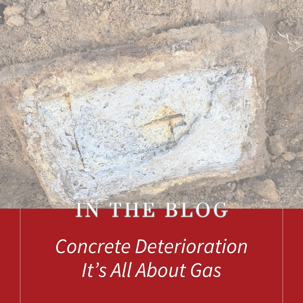Concrete Deterioration: It’s All About Gas
When homeowners hear about septic tank damage, they often think of tree roots, ground shifting, or just old age. But there’s another silent culprit responsible for many concrete tank failures: hydrogen sulfide gas.
What Causes Septic Tank Deterioration?
Septic systems rely on anaerobic bacteria, which digest waste without oxygen. These bacteria naturally produce hydrogen sulfide (H₂S) as a byproduct. This gas gives sewage its distinct rotten egg smell, and while that’s unpleasant enough, the real damage comes when this gas interacts with moisture inside a concrete tank and/or distribution box.
When hydrogen sulfide meets moisture on the tank walls or lid—especially in the air space above the liquid—it forms sulfuric acid. This acid is extremely corrosive and slowly breaks down concrete, leading to visible crumbling or decay.
Over time:
- White, chalky residue around outlets can appear.
- Rusty streaks may form if the acid reaches the steel reinforcement inside.
- Cracks or holes could compromise the entire structure.
If not caught early, this deterioration can cause serious structural failure, requiring full tank and/or distribution box replacement.
Why It Matters for Homeowners
Most homeowners never see their septic tank, so damage often goes unnoticed until there’s a problem—like a backup or sinkhole. But early signs of deterioration can often be spotted during routine inspections or septic pumping.
Common Misunderstanding: Broken Lids and Septic Pumping
A common misconception we hear “The lid was fine until you opened it!” It’s an understandable observation—after all, most people don’t get a close look at their septic tank lid until it needs to be opened. But in reality, concrete septic tank lids—especially older ones—are often already deteriorated and fragile. Overtime, the concrete septic tank lids weaken due to ongoing exposure to those gases, moisture, and environmental conditions inside and outside the tank. Even when a lid looks intact on the surface, the concrete becomes brittle or compromised underneath. When our team arrives to pump or inspect the tank, simply removing the lid can cause it to crack, crumble, or break entirely, even when handled with care.
Know the Signs of Trouble
If your septic professional mentions:
- White decay near the tank outlet
- Rust stains on the walls
- Unusual cracks or leaks during pumping
…take those signs seriously. These could indicate active acid damage.
Prevention and What You Can Do
- Schedule Regular Septic Pumping’s: Have your septic tank pumped and inspected at least every 3 to 5 years—or more frequently if you’re in a high-usage household. Professionals can spot early signs of deterioration before it becomes serious.
- Improve Ventilation in the Tank: Enhancing airflow within your septic system is crucial to reducing the accumulation of harmful gases like hydrogen sulfide. Utilizing an innovative aerobic remediation product inside the septic tank introduces oxygen and specialized aerobic bacteria into your septic tank. This process transforms the tank's environment, promoting the growth of bacteria that efficiently break down waste. The system includes the installation of a bacterial generator and an air pump, which continuously supplies oxygen to support the aerobic bacteria. As these bacteria digest solid waste, they produce cleaner effluent that flows into the drain field, helping to reverse clogs caused by bio mat buildup in soil pores. This non-invasive solution not only improves the efficiency of your septic system but also extends its lifespan by preventing the conditions that lead to structural damage. See our page Aerobic Remediation to learn more.
Final Thoughts
Hydrogen sulfide is a natural part of how septic systems work—but when it turns into sulfuric acid, it can quietly eat away at your tank. That’s why routine maintenance and early detection are key to preventing costly repairs and protecting your system.
If you haven’t had your tank checked recently, give us a call. We offer thorough inspections, professional pumping, and honest recommendations to keep your septic system healthy and your property protected.

